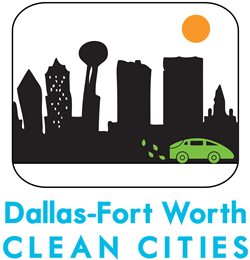
Arlington, Texas — The Dallas-Fort Worth Clean Cities Coalition recently recognized public-sector fleets for their efforts to reduce petroleum use and improve air quality as part of its annual Fleet Recognition Awards.
The winners included nine Gold Level, four Silver Level and nine Bronze Level recipients.
The City of Southlake and Dallas Area Rapid Transit were awarded Gold status for the third straight year, while the cities of Carrollton, Dallas, Denton and Lewisville, and Dallas Fort Worth International Airport earned the top designation for the second consecutive year. The City of Grapevine and Denton Independent School District won Gold for the first time.
Awards were presented based on entities’ scores on the DFW Clean Cities Annual Survey. Each entity could earn up to 55 points for emissions reduction, 25 points for reducing fuel consumption and 20 points for partnering with DFWCC. Gold Level status required 45-100 points; Silver Level status required 34-44, and Bronze Level status required 28-34.
The winners of Silver recognition were the cities of Coppell and Irving, the Town of Addison and Denton County. The Bronze winners were the cities of Arlington, Benbrook, Frisco, McKinney and Mesquite, along with Kaufman County, Prosper ISD, SPAN Transit and Trinity Metro.
This year’s winners were instrumental in helping the region reduce:
• 23.9 million gallons of gasoline equivalent
• 734,089 pounds of ozone-forming nitrogen oxides (NOx)
• 125,058 tons of greenhouse gas emissions
Clean Cities also highlighted significant improvements in areas such as the reduction of NO
x, transition to alternative fuels and gasoline gallon equivalent savings through the Shining Stars Awards. DART, the cities of Carrollton, Coppell and Dallas and SPAN Transit were recognized for their NO
x reduction. Three of these entities -DART, and the cities of Coppell and Dallas – were joined by the City of Grapevine as Shining Stars in the category of gasoline gallon equivalent reduction. The Shining Stars showing the greatest progress transitioning to alternative fuels were the cities of Carrollton and Plano, Denton ISD and Prosper ISD.
DFW Clean Cities introduced the Fleet Challenge this year, recognizing entities that met or exceeded goals they set in the 2019 survey. The cities of Bedford, Carrollton and Frisco, and DFW Airport received this inaugural recognition.
Fleet Challenge Recipients:
| Recipient |
Fleet Challenge Goal |
Result |
| Bedford |
10% increase in fuel economy |
33% increase in fuel economy on 42 vehicles |
| Carrollton |
10% increase in alternative fuel vehicles |
21% increase in AFVs |
| Frisco |
2% increase in fleet’s fuel economy |
8% increase on 200 vehicles |
| DFW Airport |
Increase RNG volume to >50% of natural gas use |
RNG reached 55% of natural gas use |
The Clean Cities initiative is a locally based, public-private partnership that promotes practices and decisions to reduce petroleum consumption and improve air quality in the transportation sector. For more information, visit
www.dfwcleancities.org.
About the North Central Texas Council of Governments:
NCTCOG is a voluntary association of local governments established in 1966 to assist local governments in planning for common needs, cooperating for mutual benefit, and coordinating for sound regional development. NCTCOG's purpose is to strengthen both the individual and collective power of local governments and to help them recognize regional opportunities, eliminate unnecessary duplication, and make joint decisions.
NCTCOG serves a 16-county region of North Central Texas, which is centered on the two urban centers of Dallas and Fort Worth. Currently, NCTCOG has 238 member governments including 16 counties, 169 cities, 22 school districts, and 31 special districts. For more information on the NCTCOG Transportation Department, visit
www.nctcog.org/trans.
About the Dallas-Fort Worth Clean Cities Coalition:
|
In 1995, the Dallas-Fort Worth (DFW) Clean Cities became one of the first Clean Cities coalitions under the Energy Policy Act’s provision for an organization that promotes the use of alternative fuels to lessen America’s dependence on foreign sources of petroleum. Dallas-Fort Worth Clean Cities is a locally based, public/private partnership that seeks to advance energy security, protect environmental and public health, and stimulate economic development by promoting practices and decisions to reduce transportation energy impacts and improve air quality, primarily in the transportation sector.
# # #